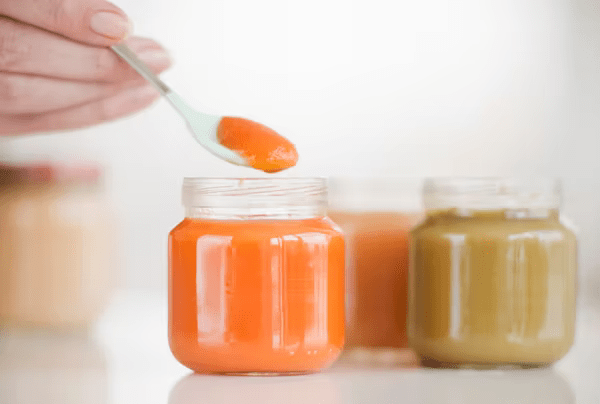You may have heard: lead is repeatedly found in drinking water, certain species of fish are high in mercury, and worrying levels of arsenic have been found in rice, but you may not know why this is a problem or that these elements (Mercury, Cadmium, Lead and Arsenic), commonly known as “heavy metals”, can be found in just about every food grown in the ground.
What may be more surprising is that baby foods are carrying high levels of these heavy metals.
Over time, exposure to heavy metals damage the health of adults and children. Babies and children are particularly at risk because of their smaller size. Moreover, their developing brains and organ systems absorb heavy metals easier than adults.
According to a recent national survey by Consumer Reports, more than 90 percent of children 3 years of age and younger eat pre-packaged foods. More notable are the conditions of those pre-packaged foods:
• All products contained measurable amounts of at least one of these heavy metals: cadmium, inorganic arsenic or lead and mercury
• About two thirds (68 percent) had worrying levels of at least one heavy metal.
• Snacks and products containing rice and / or sweet potatoes were particularly susceptible to high levels of heavy metals.
• Organic foods contain heavy metals just as often as conventional foods.
How Heavy Metals Harm Babies
The human body needs small amounts of certain metals, such as iron and zinc, to function properly, but cadmium, inorganic arsenic, lead, and mercury (especially methylmercury) are toxic and pose a particular hazard to humans. Exposure to even low levels of these heavy metals at a young age can increase the risk of various health problems. Heavy metal exposure or consumption are linked to lower IQs, behavior problems, and autism and and other disorders.
The effects of early exposure to heavy metals can have long-lasting effects that may not be reversible,” says Victor Villarreal, Ph.D., assistant professor in the Department of Educational Psychology at the University of Texas at San Antonio.* Another example, Duke University researchers studied 565 adults whose lead levels were measured in childhood. Those with high childhood lead had an average of 4.25 points lower IQ than those with lower childhood lead. Exposure to inorganic arsenic can also affect IQ, according to a recent Columbia University study of third- through fifth-grade students in Maine. Students exposed to arsenic in drinking water had an IQ that was 5 to 6 points lower on average than non-exposed students.
https://theconversation.com/how-safe-is-your-baby-food-155443
https://ndl.ethernet.edu.et/bitstream/123456789/32429/1/283.Cynthia%20A.%20Riccio.pdf#page=152
Hidden Issue?
Surveys show that parents are often unaware of the potential risks of heavy metals in their children’s diet. For example, around half believed that infant foods are subject to stricter safety testing procedures and regulations than other packaged foods. But they’re not. Despite the FDA recognizing the dangers heavy metals can pose in baby and toddler foods.
in 2013 the FDA proposed limiting inorganic arsenic in apple juice to 10 ppb, the federal arsenic standard for drinking water and in 2016, the FDA proposed limiting inorganic arsenic in rice grains for infants to 100 parts per billion. In recent years, the agency has made this a priority and is working to address the health risks these elements pose, especially to the most vulnerable: children. The agency also said it “intends to consider a wide range of policies and measures to reduce exposure,” such as educating consumers on how to reduce the risk of toxic metals and study the risk posed by foods containing multiple toxic metals and work to identify products, where these combinations are more common, and investigate options for solving the problem.”
It is essential for parents to take on industry and to seek tough standards for our children’s foods. We should no longer give blind trust to those who’ve been caught plying dangerous wares on the most frail of society.
Change?
Brilliant Baby Foods‘ indoor platform allows us to grow locally, in a 100% controlled-environment. Brilliant accounts for virtually every aspect of the growing cycle. Each plant receives the precise amount of nutrients, water, temperature, humidity, and light to ensure optimal plant growth and optimal nutritional value.
Simply, heavy metals do not belong in baby food products. The risk from heavy metals to developing infants is a known danger. Safeguard your baby by giving them BRILLIANT BABY FOODS, the best and the purest baby food on earth.
We all have association with infants, whether they are our own children, grand-children, friends, family, etc. The opportunity before us is this generations’ great cause. Help us virally spread the criticality of pure baby food to give the next generation the best fighting chance. Please support the cause by donating for an infant who can’t afford a great start, or simply pre-ordering and feeding your baby Brilliant Baby Foods.
